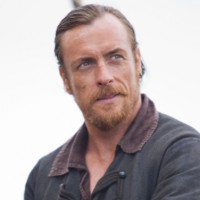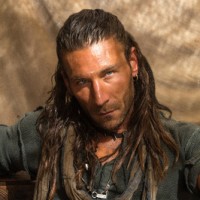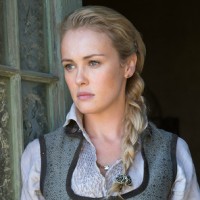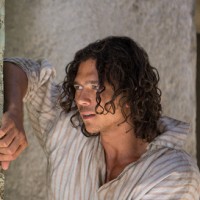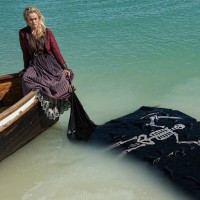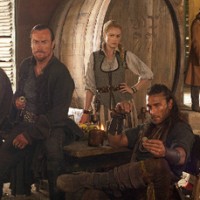Q&A Interview with BLACK SAILS Stars Toby Stephens, Hannah New & Zach McGowan, Plus Exec Prods
Mike Vicic - January 24, 2014
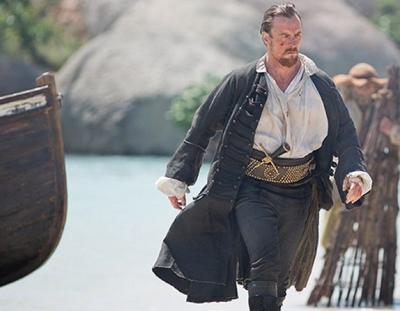
Last week at the Television Critics Association (TCA) Winter Press Tour, Starz presented a BLACK SAILS press panel that included stars Toby Stephens (playing Captain Flint), Hannah New (playing Eleanor Guthrie), Luke Arnold (playing John Silver), and Zach McGowan (playing Charles Vane); creator and executive producer John Steinberg; executive producers Robert Levine and Brad Fuller; and Carmi Zlotnik, Managing Director for Starz. The panelists reminisced about their favorite pirate tales, dished about their characters, and discussed filming in Cape Town.
A prequel to the book "Treasure Island" written by Robert Louis Stevenson, BLACK SAILS series centers on the tales of Captain Flint and his men during the Golden Age of Piracy -- 20 years before the beginning of the novel. As the British Navy returns to redeem their land and exterminate Flint and his crew on the pirate ship Walrus, another side of him emerges. He allies himself with Eleanor Guthrie, daughter of the local kingpin, to hunt the ultimate prize and ensure their survival. Plus, to hold off the British and Spanish forces, he'll make himself ruler of Nassau through any means possible, but many opponents stand in their way
BLACK SAILS premieres tomorrow, Saturday, January 25, 2014 at 9pm ET/PT on Starz.
|
|
|
|
Question: Toby, did you grow up with pirate tales when you were a kid? Toby Stephens: Well, I think initially "Treasure Island" was read to me as a child. That was really my starting point to this kind of story. I suppose the Naval battles, like Nelson, that's part of our culture. It's part of our history. So you grow up knowing about Battle of Trafalgar. I guess I knew about piracy, but it was really a mythologized version of piracy. I didn't really understand the history of it or the reality of it, which is something that this really brings to the genre. |
|
Toby Stephens (cont): I did know that from Elizabeth I to Walter Raleigh the buccaneering kind of thing was tacitly, like, "Go ahead. Interfere with Spanish French trade. They're our enemy. We'll turn a blind eye to it." In fact, they encouraged it. And if it interrupted Spanish interests in South America or the West Indies, then that was good. I did vaguely know about that from history, but I didn't really know about the details of the golden age of piracy, which BLACK SAILS deals with.
Question: Can you talk about that transformation when you put on your pirate outfit and pick up your sword?
Question: Toby, can you talk about working with Mark Ryan [who plays Gates]?
Question: Toby, are you a fan of DOWNTON ABBEY? Do you watch your mother [Dame Maggie Smith, who plays Violet Crawley] in that? Are you a big fan of it?
Question: Do you sometimes think, "Boy, this is tough work. I wish I was doing a drawing-room show?" |
|
|
|
|
|
|
|
Question: Zach, is it fun to play a pirate who was very cruel and evil? Zach McGowan: Yeah, to play a pirate in general -- and to get to do a lot of the things that have been written for these characters -- is just fun. To work in an English accent and to be out there doing it is fun. But I think what's great about what Robert and John and everyone has done is that while there is a level of brutality and cruelty and violence, I think you'll find, as you kind of watch the show, that in this world it's like the law, the rules of the jungle in some ways. The cruelty and the violence come out of that, that survival and that need to actually survive the day and make it. But, yeah, it was a blast to do. |
|
Question: Can you say, "Aargh" for us?
Question: Are you going to be back as Jody in SHAMELESS? |
|
|
|
|
|
Question: Can you talk about the sexuality of Eleanor? Hannah New: I think it's really interesting because it's a world where sexuality and boundaries have been completely broken down. So to play a young woman who doesn't have those kind of social restrictions put on her, who is free to use her sexuality, in whichever way is advantageous to her, is fabulous and a great opportunity as an actress. |
|
Hannah New: It was really important to us that, if we were going to explore this world, gender had to be a part of that, well beyond just stock wenches and the occasional cross dressing pirate. That there were women in this world, and they had very specific challenges, and they had very specific expectations. I think we've always seen the show as a bit of a Western. It's a frontier story. It's a story about necessity, day to day survival, breaking down social convention. I think both through Eleanor and through Max, Jessica Parker Kennedy's character, and through Anne Bonny, who Clara Paget plays, we wanted to explore three very different women and how they dealt with expectations that either they were living under or that they were in the process of shedding and figuring out a way to exist in a world that men ran but in which they had something to contribute.
Question: The show's about pirates, so you expect the show to have sex, but did you have to have it to be a Starz show? |
|
|
|
|
|
Question: According to Long John Silver at least, Captain Flint eventually does something really horrendous. If BLACK SAILS goes long enough, is it aiming towards that, or IS John Silver an unreliable narrator? Jonathan E. Steinberg: Both. |
|
Jonathan E. Steinberg (cont): That said, the hope is that if the show lives a long, healthy life and has a planned termination, that that end will plug into the book in some meaningful way, recontextualize some of the negative space in the book, and make things that feel like they're just about money not necessarily about money and recontextualize some of the connections between some of the characters. Hopefully, in a perfect world, some of our characters will start to become visible in the spaces in that book as well.
Question: How many seasons would you like to see it go? |
|
|
|
|
|
Question: Why did you film BLACK SAILS in Cape Town instead of Mexico or even Catalina Island? Jonathan E. Steinberg: We looked literally all over the world. You realize very quickly when you start trying to prep this show, why nobody has done it before. There were a lot of good reasons not to do it. I think what we were looking for was a series of criteria in which we needed all of them, and a lot of places only had most. We needed access to beaches. We needed those beaches to look the right way for us. We needed access to water tanks because we knew we wouldn't be able to shoot on the water for our ship work. We knew we wanted to cast out of London primarily, so we needed to be somewhere where that was feasible. We knew we needed a place where there would be experienced crews, where we knew we would have access to feature level talent. |
|
Jonathan E. Steinberg (cont): And so we looked in Europe. We looked in South America. We looked in Eastern Europe. We looked everywhere. And Cape Town was the place in which we finally got that last box checked. And I honestly don't know if we could have made it anywhere else. They've so happy to be a part of it. There's so willing to make it possible in any way, to sort of bend over backwards to make this show makable. I had seen photos and I had seen sketches. And the moment you set foot on the sets, you're in a totally different world. |
|
|
|
|
|
Question: JERICHO, HUMAN TARGET, and pirates. Jonathan, which of these things is not like the other? Why pirates? Jonathan E. Steinberg: I think the unifying principle, if there is one, is I spend a lot of time trying to figure out what people aren't doing and where there are stories that feel like they want to be a show and a world to be explored. This has been one that's been stuck in my head for a long time. No one has dug into this world, deep into the bedrock of it, into the reality of what it was like to wake up in the morning and know that this was your life; that if you were going to survive, if you were going to eat, you needed to take somebody in this environment. It's a very different tone than any other pirate story I'd ever heard. And so I'd wrestled with it and just couldn't find an entry point. |
|
Jonathan E. Steinberg (cont): Then, actually, Robert [Levine] sort of put it all together in trying to figure out how do you have a character that's familiar enough that people are going to care but malleable enough and open enough that we're not stuck in a biography? And Flint and Silver was the way to get at it. It allowed us to have the best of all worlds to embrace the reality of this world through a fictional character, but a character that I think people have a lot of investment in, especially in the case of Flint, who has this huge presence in pirate mythology, and there's almost no canon to it. He's mentioned in the book almost as a ghost, and that felt like a great opportunity to paint a very big character on a very big canvas. Early on we knew this wanted to be premium cable. This wanted to be a series that would need to find a partner that was willing to jump in with both feet. It's hard to produce. It's expensive. It's labor intensive. And but once you find that partner, you know, both with Starz and with Michael [Bay] and Brad [Fuller] and Andrew, it just immediately becomes clear this wants to be the show. This wants to be a world that you explore in the same way that you've explored a police station for the first time in THE WIRE and that you've explored a mob family for the first time in SOPRANOS. This feels like it's fresh snow in that way, that it's to be opened up for the first time. |
|
|
|

